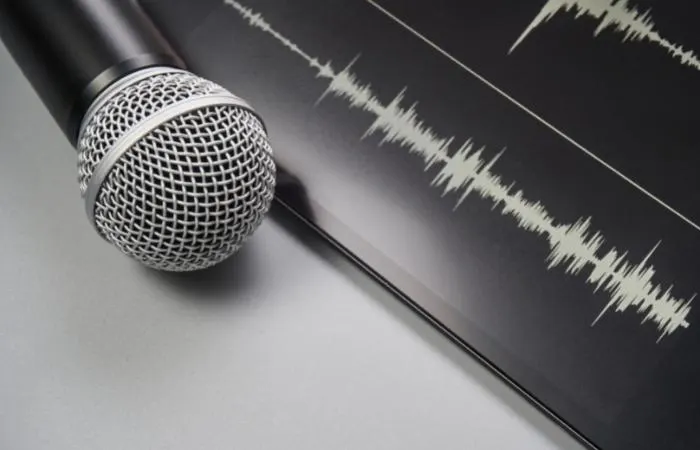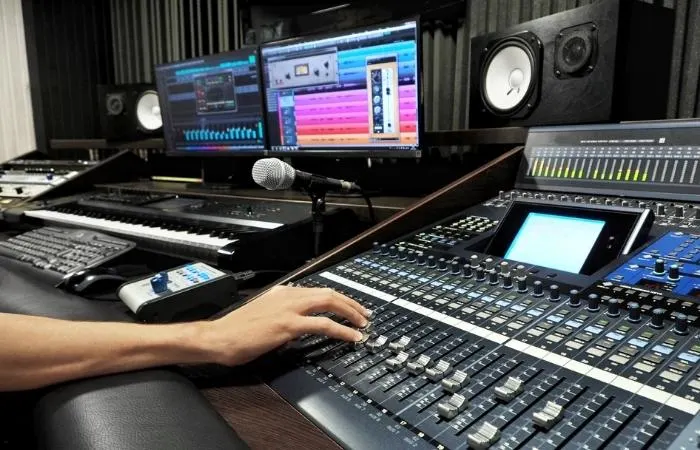Mixing vocals is hard because they are often the most prominent part of a song. This means that any imperfection will stand out more than any other instrument since the listener will pay the most attention to it. There is no room for mistakes when mixing vocals!
Mixing Vocals Is Not Easy!
Vocals are arguably the most challenging element of a track to mix, especially for music production beginners.
Although learning to mix vocals properly takes plenty of time, practice, and patience, any dedicated music producer can become a vocal mixing pro if willing to put in the hours!
Any music production skill I have picked up only comes from hard work and time invested.
Let’s dive into why mixing vocals is so complex and a few vocal production tips and tricks.
Why Is It So Hard To Mix Vocals?

Let’s take a closer look at why it is so difficult to mix vocals. Check it out!
They Are So Detrimental To A Track
The first reason it is so hard to mix vocals is that they are detrimental to your track. This means there is no room for mistakes since it is the main thing people will listening for.
If you do not capture a quality vocal recording and mix it properly, it will stick out like a sore thumb. This is part of the reason why it is so hard to mix vocals.
We Are So Used To How The Human Voice Sounds

Another reason it’s so hard to mix vocals is that we are so used to how the human voice sounds. After all, we have all been hearing it since birth.
Therefore, our ears will gravitate toward any imperfections we hear in a vocal mix.
This is another reason why mixing vocals is so tricky!
Sometimes You Have To Work With A Less Than Ideal Vocal Recording
Something that will make mixing vocals extremely difficult is having to work with a low-quality vocal performance or recording. This is why getting a professional vocal recording is essential before attempting to mix it.
Even if you can’t afford to record in a high-end studio, do what you can at home regarding gear, acoustic treatment, performance, etc., to get the best results.
There is nothing harder than having to mix a poor-quality vocal recording.
The Human Voice Is Such A Dynamic Instrument
The final reason vocals are so hard to mix is that the human voice is such a dynamic instrument. Because of this, it can be tough to control and blend a vocal track within your mix.
While other instruments might be a bit more consistent in their dynamic level, vocals can span a vast dynamic range making them tricky to mix.
Remember, although mixing vocals is hard, anyone can become a competent vocal mixer if prepared to put in the time and practice.
How Do You Get Good At Mixing Vocals?

The only way to get good at mixing vocals (or mixing anything for that matter) is to spend time practicing and honing your craft.
The reason for this is that one of the main components of learning to mix is developing your ears to hear sound and music in new ways.
This is something that takes loads of time and repetition.
Whatever educational resources you find for mixing vocals, verify that they are accurate and reliable.
Why Do My Vocals Sound Harsh?
Here are a few of the more common reasons why your vocals might be sounding harsh, as well as some possible solutions to fix them:
- You recorded the vocals without a pop filter (try using a de-esser plugin to remove any sibilance sounds that are present and an EQ plugin to cut specific frequencies in the high-mids and highs).
- You recorded the vocals clipping or with too high of gain (you can try to use EQ to smooth this out, but unfortunately, there is no way to fix clipped audio once you have already recorded it).
- You recorded the vocals in a space that is not acoustically treated (use an EQ plugin to locate and cut unpleasant frequencies in your mix caused by the recording space)
- The vocalist has a voice with a lot of presence in the high-mids and highs (use an EQ plugin to lower the high-mid and high-frequency range).
You will notice that your vocals are less harsh in the higher frequencies while your lower frequencies remain untouched.
Remember, the more work you put into getting a great vocal recording on the front end, the less work you will have to do to mix that vocal track later.
Why Do My Vocals Not Sit In The Mix?
Check out this list of reasons why your vocals might not be sitting in the mix:
- You recorded them in a drastically different space than the rest of your track.
- You must make other EQ moves to blend them with your track.
- You did not use the correct vocal compression to fit the rest of your arrangement.
- You need to try a different volume level in the mix.
- You are working with a cluttered arrangement.
There are plenty of reasons your vocals might not be sitting in the mix.
Listen to your arrangement and vocal recording to figure out your best course of action.
How Do Professionals Mix Their Vocals?

Here are the significant aspects of getting a professional vocal mix:
- Start by recording with a quality microphone/pop filter in an acoustically treated studio space. You can’t get a professional vocal mix without a professional vocal performance/recording.
- Use tools such as pitch correction and de-essing to clean up your vocal track before further processing it. Also, go through and mute sections of your vocal recording where there are no vocals; there is no need for dead air or background noise.
- Use EQ to cut harsh or unneeded frequencies from your vocal recording and boost other ones. The EQ moves you should make will differ depending on the vocal recording you are mixing.
- Use compression to even out the dynamics of your vocal track and make it more present in the mix. Also, try experimenting with series compression, parallel compression, sidechain compression, and multiband compression to achieve different results.
- Know when to use volume automation in your track instead of relying on compression.
- Use saturation to add warmth and color to your vocals.
- Use a little reverb and/or delay to add space, interest, and excitement to your vocals but don’t go too far with this. You don’t want to wash your vocals out.
Although you will not be able to mix vocals on your first try professionally, you will notice results over time if you remember these vocal mixing fundamentals.
How Long Does It Take To Mix Vocals?
This depends on your experience level and the quality of the vocal recording you are working with.
For example, a skilled producer who has to mix a high-quality and professional vocal recording will be able to do so quickly.
However, if that same producer has to mix a poorly recorded vocal track, it will take them much more time since they will be battling the vocal recording itself. This will take an inexperienced producer even longer.
There is no standard amount of time it will take you to mix a vocal track. It all depends on the circumstances that you are dealing with.
Any Mixing Vocals Tips and Tricks?
Here are a couple of my favorite tips and tricks for mixing vocals:
- Start by taking the time to capture a good vocal recording, and the mixing will be much easier. Use a quality microphone with a pop filter in an acoustically treated studio space.
- Use a de-esser plugin to remove sibilances from your vocal track.
- Use a bit of saturation on a vocal track to add color and warmth.
- Try a little reverb and/or delay to add space and excitement to your vocals.
- Don’t use a super fast attack time when compressing vocals; this will smash your vocal transients.
- Know when to use volume automation instead of relying on compression (sometimes, you will have to manually control the volume of individual sections instead of just using compression).
- Use a multiband compressor plugin with a single band on the high-mids/highs to smoothen out any harsh frequencies.
- EQ is your best friend when sculpting and shaping your vocal track to sit in your mix.
These tips and tricks won’t necessarily work on every track that you are producing. Still, I recommend you experiment with them and see what vocal chain works for you and your workflow.
How Can I Soften My Vocals?
To soften your vocals, I recommend using EQ and reverb.
EQ
Use your preferred EQ plugin to reduce any harshness from your vocal track.
I find that these harsh frequencies are usually in the mid/high-mid range, somewhere between 800Hz-5kHz.
Start by looking there, but remember that every vocal track will be different.
Reverb
Use your favorite reverb plugin to add some ‘space’ to your vocal track. This will make your vocal recording sound bigger and also smoother.
Remember not to go overboard with reverb or other FX when mixing vocals. A little goes a long way; you don’t want to ‘wash out’ your vocal track with excessive reverb.
How Do I Bring Vocals Forward To a Mix?
Here are a few different methods that you can implement to bring your vocals forward in a mix:
- Use compression to control the dynamics of your vocals and make them more present (try experimenting with series compression, parallel compression, and sidechain compression, also).
- Use EQ to boost the high-mids/highs. This will help your vocal track stand out amongst your arrangement.
- Duplicate your vocal track and try some parallel processing (this is when you leave one vocal track dry and mix the duplicate track).
It can be super hard to bring your vocals to the front of a mix; hopefully, these tricks will help!
How Do I Add Life To My Vocals?
Here are a couple of tricks that you can use to add some life to a vocal track:
- Use saturation to add color and presence.
- Use reverb, delay, or other FX (don’t go overboard).
- Use an EQ to make a boost somewhere in the high-mids/highs.
There are plenty of ways to add some life to a vocal track.
Try experimenting with different techniques to determine what works for you and your mix.
Related Questions
Why Is Mixing So Hard?
Mixing is so hard because it is an elaborate process that involves a ton of moving parts.
Also, mixing requires you to listen very closely to pick up small details and subtleties within your mix.
Learning to mix properly takes years of practice and a ton of dedication/patience!
Can You Work With a Clipping Vocal Recording?
There is nothing worse than trying to mix a clipping vocal recording into a track.
If you have recorded a vocal track that is clipping, it will sound blown out and unpleasant in your mix. Your best bet will always be re-recording the vocal track at a more appropriate gain level.
Remember that you should never use a clipping vocal track in your mix unless you have to do so! A good source tone is the first step to a good mix.
How Long Does It Take To Get Good At Mixing/Mastering?
Although there is no set amount of time that it will take you to become competent at mixing and mastering, it does take quite a while for most people.
This is because learning to mix and master requires learning to listen and use your ears as you have never had before. This kind of development happens over the years as you hone your skills.
Remember, learning to mix and master will not be a quick affair!
Should Vocals Be The Loudest Part In a Mix?
Your lead vocal track should typically be the loudest and most prominent element in your mix. There are, however, some exceptions to this, depending on the genre. For the most part, you would be wise to let your vocals soar above the other instruments in your mix.
Remember, even if you have grown quite fond of your instrumental arrangement, most people listening to music want to mostly hear the vocals.
Should I Record Vocals With a Pop Filter?
I almost always track vocals with a pop filter. This is because they help cut any sharp sibilance sounds that the human voice often makes.
Although you can always de-ess a vocal track after recording it, you should still use a pop filter to help capture the best possible vocal recording from the get-go. Plus, pop filters are not expensive at all. There is no need to spend more than twenty bucks on a pop filter.
Final Words
As you have seen, mixing vocals is no easy task!
Being a competent vocal mixer takes a lot of time and practice; it is not something you can learn to do overnight.
Here are some of the main reasons that it is so hard to nail a vocal mix:
- Vocals are often the most prominent and important part of a mix, so people notice vocal mix issues more easily than other instruments.
- The human voice is a dynamic instrument, and it can be hard to control and adequately mix vocal transients.
- We are so used to how the human voice sounds that we will quickly notice anything that sounds off.
- You might be working with a clipping or otherwise low-quality vocal recording.
Although mixing vocals is not easy to master, you can also become a vocal mixing pro with dedication, time, and practice!
For more great tips, check out this article on using mono or stereo plugins on vocals.

 Want to connect with other music producers for help and guidance?
Want to connect with other music producers for help and guidance?